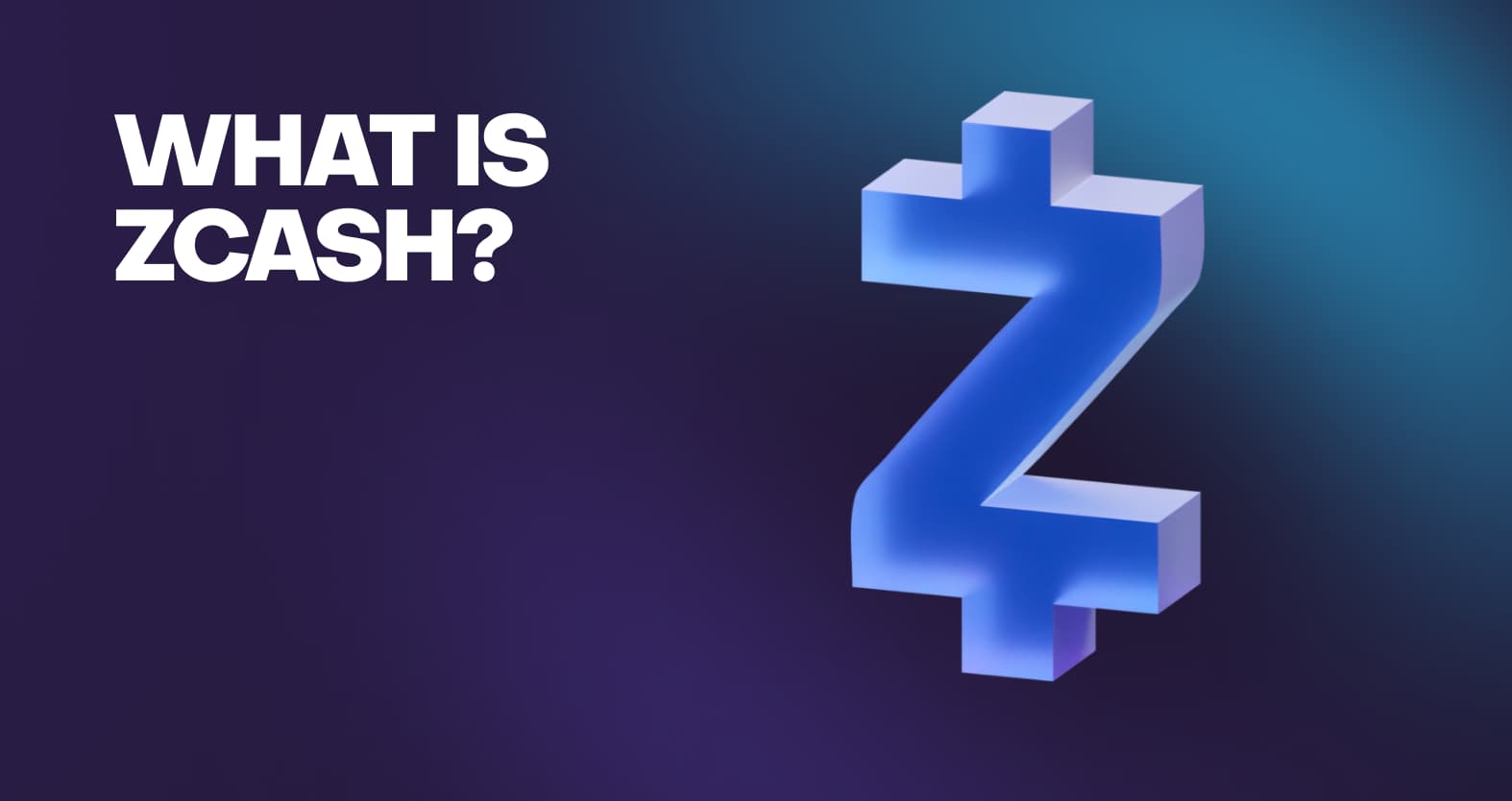06 October 2022
Updated: 03 February 2023
What Is Zcash (ZEC)? — How Privacy Coins Add User Value

Table of contents
In the early 2010s, when the blockchain space was dominated mostly by cyberpunks, anonymity, and privacy were huge concerns. This led to the development of Zcash in 2016, one of the first privacy-enabling cryptocurrencies.
Bitcoin ushered in a new era of pseudonymous digital payments, but transactions are still trackable if the addresses can be traced or tied to an external body. Satoshi Nakamoto created the framework of a verifiably scarce and limited digital currency, but various organizations wanted to take it one step further. Zcash allows its users to opt for private or voluntarily disclosed transactions. This feature permits platform users to be open with their spending regarding KYC (know your customer) and AML (anti-money laundering) regulations, but only if they choose so, echoing the precedent set by physical cash.
A Journey of Ups and Downs
The first block of the Zcash blockchain, a hard fork of the Bitcoin codebase, was mined in October of 2016.
Price and Market Cap
The initial demand was shockingly high, much greater than it is today, with ZEC shooting up to around $5,000 within the first week. However, the hype quickly subsided, with the price per coin dropping to an all-time low of under $40 in mid-December 2016, just two months after its initial release. This demonstrates the cryptocurrency hype cycle well and shows that they do not change, as similar patterns were experienced in the bull run of late 2017 with many coins. This may also happen again in this new era of IDOs, or initial DEX offerings.
Coin Supply
Like Bitcoin, Zcash has a maximum supply of 21,000,000, a fixed amount that will never alter. In theory, this scarcity will drive up the value of the tokens if demand continues to rise, as we've seen with the price of Bitcoin. There are some major differences between the two coins as well, with a current circulating supply of slightly over 10,000,000 coins and 20% of the block reward going back to the Zcash development team. Both networks run on Proof of Work (PoW) for blockchain consensus. However, Bitcoin uses the SHA-256 mining algorithm, while Zcash uses Equihash.
Transparent and Hidden Transactions
Zcash offers both transparent and hidden transactions, taking what Bitcoin initially provided and building on it to cater to a more specific audience. With zk-SNARKS, a zero-knowledge proof that enables transaction validation without having to reveal the information to the validator, users can send fully anonymous transactions to anyone. This is done through a 'shielded' transaction pool, but many users do not opt for this feature. Since the majority of Zcash users send transactions regularly, without privacy protection, Chainanalysis, an automated blockchain tracking and reporting platform, has been able to "trace and provide transaction values and at least the sender or receiver address for over 99% of Zcash activity." As the saying goes "If you don't use it, you lose it." This seems to have happened to the anonymity of the vast majority of Zcash active addresses. Although Chainanalysis was able to uncover this information, it shows that users can remain private on the platform, although evidently, most users don't care enough to do this.
2018 Network Vulnerability
Since its launch, Zcash has been able to maintain a level of dominance in the privacy coin sector, maintaining itself as a top fifty cryptocurrency by market capitalization. This was almost drastically hampered when the team almost covered up a critical network bug. This bug, discovered in 2018, would have allowed a knowledgeable hacker to infiltrate the network and create an infinite amount of fake Zcash (ZEC), effectively flooding the network and driving the price to near $0. The main developers of Zcash tried to quietly hide this massive vulnerability, rolling out an update fixing the issue in a network upgrade without a lot of commotion.
The Zcash Roadmap
Since the 2018 network vulnerability incident, Zcash has managed to evade any additional controversy and is now concentrating on developing its network with new upgrades. The Zcash developer team is now working on the zcashd rollout, with each new iteration introducing new features to the network. There are currently three upgrades in the series that have been introduced to the mainnet, with the roadmap showing what Zcash holders can expect to see. The mainnet upgrades that have already been implemented are Blossom (NU2), Heartwood (NU3), and Canopy (NU4), and the unnamed NU5.
What Has Already Been Accomplished
Together two organizations - Electric Coin Co. and the Zcash Foundation - launched Blossom as the third major network upgrade. This implementation delivered a longer frequency between blocks, allowing for faster transactions on the network and keeping transaction fees low while upgrading the number of transactions the network can handle each hour.
Heartwood, the fourth network upgrade, introduced Flycient and Shielded Coinbase UTXOs. These upgrades enabled easier third-party integration into the network and offered better privacy options through an enhanced shield. The final mainnet upgrade before the current Zcash status was Canopy, which was named by the community for themes representing collaboration and a vibrant and hospitable ecosystem for participants. This upgrade ushered in a new developer fund, one that is responsible for taking 20% of network cryptocurrency mining rewards.
Where Can You Buy Zcash (ZEC)?
As a cryptocurrency with a market cap well over $1 billion, Zcash is widely available on most of the market's largest centralized exchanges. This includes players like Binance, Coinbase, Okex, HitBTC, and many others, but when looking at the available trading markets, it becomes evident that decentralized exchanges are widely left out. This is largely due to Zcash being a fork of Bitcoin, making it incompatible with ERC20 token exchanges like Uniswap and Sushiswap exchange.
If you'd like to purchase Zcash privately and securely with a non-custodial exchange, AtomicDEX is a valid option. Built by Komodo Platform, AtomicDEX offers cross-chain liquidity and exchanging capabilities, enabling users to trade for Zcash natively. AtomicDEX gives everyone full control over their personal data when making trades - an important feature for experienced and new users alike.
Storing Zcash (ZEC)
Zcash has a plethora of storage options available, both in centralized and decentralized forms to cater to all of its users' needs. Remember: If you do not have possession of your private keys (i.e. your tokens are stored on an exchange or other custodial platform), you increase the chances of having the funds misappropriated by a bad actor. Some of the best wallet options for Zcash (ZEC) storage are mobile wallets with shielded-address support.
Unlike the majority of options, wallets allow users to partake in private transactions. This is impossible with wallets that require transparent-address support. Additionally, Zcash offers full node wallets for the whales that want to take part in transaction validation, but for most users, a shielded address wallet should suffice. If you are looking to store your Zcash (ZEC) for the long-term and not actively use it, a hardware wallet or paper wallet may be your safest option.
Summary & Future Outlook
Even though Zcash recently implemented a greater development team reward, there is a lot to look forward to with this network. As more people begin to use cryptocurrencies as viable fiat alternatives, an option for private transactions will be a major key to protecting users and their spending habits from wandering eyes. This will bode well for Zcash and its stakeholders, as it has a lot of the same qualities that Bitcoin offers but with more user-focused benefits.
Hold and Trade ZEC On AtomicDEX
AtomicDEX is a non-custodial multi-coin wallet and atomic swap DEX. Store Zcash as well as Bitcoin, Dogecoin, Dash, Qtum and many other coins in your own wallet. When you're ready to trade, AtomicDEX supports cross-chain swaps. Your keys, your coins.




